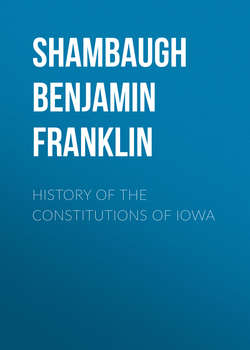Читать книгу History of the Constitutions of Iowa - Shambaugh Benjamin Franklin - Страница 2
I
INTRODUCTION
ОглавлениеThree score years and ten after the declaration went forth from Independence Hall that "all men are created equal," and fifteen years before the great struggle that was to test whether a nation dedicated to that proposition can long endure, Iowa, "the only free child of the Missouri Compromise," was admitted into the Union on an equal footing with the original States.
Profoundly significant in our political evolution are events such as these. They are milestones in the progressive history of American Democracy.
To search out the origin, to note the progress, to point to the causes, and to declare the results of this marvelous popular political development in the New World has been the ambition of our historians. Nay more, the "American experiment" has interested the talent of Europe; and our political literature is already enriched by De Tocqueville's "Democracy in America," by von Holst's "Constitutional and Political History of the United States," and by Bryce's "American Commonwealth." Ever since its adoption the Constitution of the "Fathers" has been the most popular text-book of constitution drafters the world over.
At the same time it is strangely true that the real meaning, the philosophical import, of this interesting political drama has scarcely anywhere been more than suggested. A closer view reveals the fact that all of the documents themselves have not yet been edited, nor the narrative fully told. At present there is not a chapter of our history that is wholly written, though the manuscript is worn with erasures.
To be sure, Bancroft has written exhaustively of the Colonies; Fiske has illuminated the Revolution and portrayed the "Critical Period;" Frothingham has narrated the "Rise of the Republic;" Parkman has vividly pictured events in the Northwest; McMaster has depicted the life of the people; von Holst has emphasized the importance of slavery; Rhodes has outlined more recent events; and a host of others have added paragraphs, chapters, monographs, and volumes to the fascinating story of the birth and development of a Democratic Nation. But where are the classics of our local history? Who are the historians of the Commonwealths?
These questions reveal great gaps in our historical literature on the side of the Commonwealths. Nor have the omissions passed unnoticed. Bryce likens the history of the Commonwealths to "a primeval forest, where the vegetation is rank and through which scarcely a trail has been cut." And yet it is clearly evident that before the real import of American Democracy can be divined the forest must be explored and the underbrush cleared away.
This is not a plea for localism or particularism. On the contrary, it suggests the possibility of a broader view of our National life. It points to the source of our political ideals. For nothing is more misleading than the inference that the life of our people is summed up in the Census Reports, the Journals of Congress, and the Archives of the Departments at Washington.
The real life of the American Nation spreads throughout forty-five Commonwealths. It is lived in the commonplaces of the shop, the factory, the office, the mine, and the farm. Through the Commonwealths the spirit of the Nation is expressed. Every American community, however humble, participates in the formation and expression of that spirit.
Thus the real significance of the Commonwealth in any philosophical consideration depends not so much upon its own peculiar local color as upon the place which it occupies in the life and development of the larger National whole.
It is so with Iowa. Here within the memory of men still living a new Commonwealth has grown to maturity, has been admitted into the Union, and now by common consent occupies a commanding position in National Politics. It is, moreover, from the view-point of these larger relations that the political and constitutional history of Iowa will ultimately be interpreted. No amount of interest in merely local incident or narration of personal episode will suffice to indicate the import of Iowa's political existence. He who essays to write the history of this Commonwealth must ascend to loftier heights.
To narrate briefly the history of the Constitutions of Iowa, and therein to suggest, perhaps, somewhat of the political ideals of the people and the place which this Commonwealth occupies politically in the progressive history of the larger Commonwealth of America, is the purpose of these pages.
